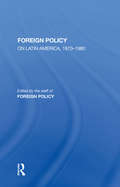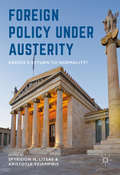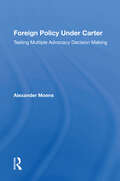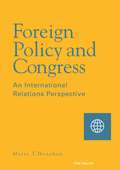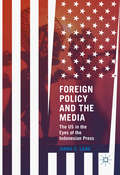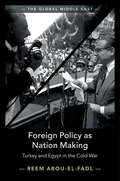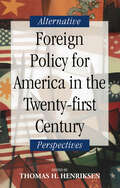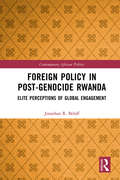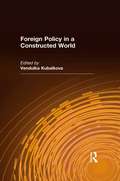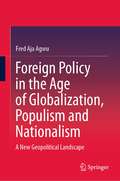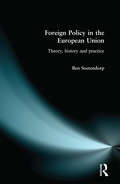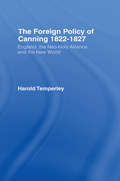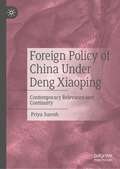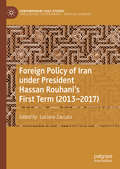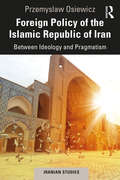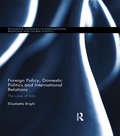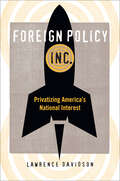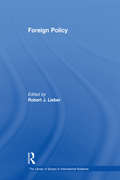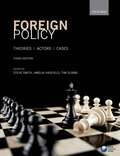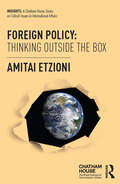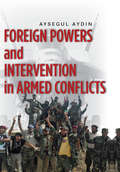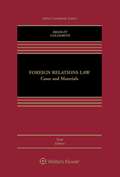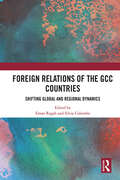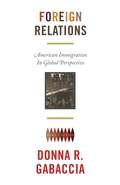- Table View
- List View
Foreign Policy On Latin America, 1970-1980: Can Eu Foreign Policy Make An Impact (American Foreign Policy Council Ser.)
by Foreign PolicyThis book presents articles on Latin America that appeared in foreign policy in the 1970s. It points out that U.S. international domination rested on U.S. command of strategic nuclear weaponry; the role of the dollar; and U.S. control through firms of the world's fuel supplies of oil and uranium.
Foreign Policy Under Austerity
by Aristotle Tziampiris Spyridon N. LitsasThis book examines the continuities and substantial transformations in Greek foreign policy before the beginning and during the unfolding of the economic crisis. Although up until now, significant attention has been cast on the rise of the neo-Nazi movement, the abuses and dysfunctions of the Greek economy, and the immense social ramifications of unemployment, less is understood about the impact on Greek diplomacy and foreign policy. This collective work not only attempts to delineate future trends in Greek foreign policy, but also seeks to explore the current events that resemble more a Greek tragedy than the systemic challenges that every nation has to face. This edited volume, quite original in its field of analysis, will be of interest to International Relations academics, foreign policy professionals, Politics and Economic students and the general public who follow developments pertaining to Greece and the European Union, as well theoretical debates surrounding International Relations.
Foreign Policy Under Carter: Testing Multiple Advocacy Decision Making
by Alexander MoensOriginally published in 1990, this volume looks at the Carter administration and the policy decisions his national security advisor Zbigniew Brzezinski, Secretary of State Cyrus Vance and the Secretary of Defense Harold Brown during the presidency. Referring to case studies of Carter administration decision making which in the author's view demonstrate Brzezinski's transformation from brokerage to an advocate role- SALT II in early 1977, Ogaden War in 1977-78, the normalisation of US relations with China (1978) and the fall of the Shah of Iran in 1978-79.
Foreign Policy and Congress
by Marie T. HenehanIn the traditional view of foreign policy making in the United States, the President is considered the primary authority and Congress is seen as playing a subsidiary role. Marie T. Henehan looks at the effects of events in the international system on both the content of foreign policy and what actions Congress takes on foreign policy. Henehan argues that the only way to understand the way congressional behavior varies over time is by looking at the rise and resolution of critical issues in foreign policy, which in turn have their origin in the international system. When a critical foreign policy issue arises, congressional activity and attempts to influence foreign policy increase. Once the debate is resolved and one side wins, a consensus emerges and Congress settles into a more passive role. Using a data set consisting of all roll call votes on foreign policy issues taken by the Senate from 1897 to 1984 to generate indicators of Congressional behavior, together with the rise and fall of critical issues in international relations, Henehan is able to develop a more nuanced understanding of Congress's role in foreign policy making over time. In recent years political scientists have begun to consider the impact of the international system on domestic policy. Part of the difficulty of some of this work, as well as work on Congress's role in foreign policy, is that it has been limited in terms of time and the number of events the analysis considered, depending on case studies. This book offers a systematic consideration of the effects of international events on domestic politics, crossing many different kinds of international activity, and provides a unique longitudinal view of Congressional action on foreign policy. This book will be of interest to scholars of international relations, American foreign policy making, and Congress. Marie T. Henehan is Assistant Professor of Political Science, Vanderbilt University.
Foreign Policy and the Media
by Jarno S. LangThis book analyzes the response of the Indonesian press to American foreign policy during the administrations of Presidents Bush and Obama. Situated in Southeast Asia, Indonesia is the world's fourth most populous country and the largest Muslim nation, and as such is a potentially vital economic and strategic partner to the US in the 21st century. Ever since Indonesian independence post World War II, relations to the US have been marked by ups and downs. The author argues that the way the Indonesian public perceives the world has an impact on the national self-image that again heavily influences national foreign affairs. For both the US and Indonesia, this is a crucial moment in bilateral relations. This study explores Indonesian media responses to American foreign policy by analyzing more than 400 press articles. In the context of President Obama's declared "pivot to Asia", both countries need to find a way to foster better relations.
Foreign Policy as Nation Making: Turkey and Egypt in the Cold War (The Global Middle East #6)
by Reem Abou-El-FadlAfter the Second World War, Turkey and Egypt were among the most dynamic actors in the Middle East. Their 1950s foreign policies presented a puzzle, however: Turkey's Democrat Party pursued NATO membership and sponsored the pro-Western Baghdad Pact regionally, while Egypt's Free Officers promoted neutralism and pan-Arab alliances. This book asks why: what explains this divergence in a shared historical space? Rethinking foreign policy as an important site for the realisation of nationalist commitments, Abou-El-Fadl finds the answer in the contrasting nation making projects pursued by the two leaderships, each politicised differently through experiences of war, imperialism and underdevelopment. Drawing on untapped Turkish and Arabic sources, and critically engaging with theories of postcolonial nationalism, she emphasises local actors' agency in striving to secure national belonging, sovereignty and progress in the international field. Her analysis sheds light on the contemporary legacies of the decade which cemented Turkey's position in the Western Bloc and Egypt's reputation as Arab leader.
Foreign Policy for America in the Twenty-first Century: Alternative Perspectives
by Thomas H. HenriksenIn its unprecedented position as sole world superpower, the United States must judiciously consider what course to take in foreign affairs. Foreign Policy for America's Twenty-first Century: Alternative Perspectivespresents six carefully crafted and bold approaches to this problem from some of the nation's foremost foreign policy experts. Chosen not for their unanimity but for their conflicting visions, these essays are written in accessible prose without esoteric language or scholarly jargon. Such issues as grand strategy, globalization, isolationism, and free trade are discussed in the context of a post-cold war world and a new century.
Foreign Policy in Post-Genocide Rwanda: Elite Perceptions of Global Engagement (Contemporary African Politics)
by Jonathan R. BeloffThis book examines how Rwandan elites within the government, private sector and civil society perceive the nation’s political and economic relationship with the international community. Using testimonies and interviews of Rwandan political, military and economic leaders, and bureaucrats, this book examines the intersubjective beliefs that formulate how Rwanda engages with the international community. The book presents and analyses three primary intersubjective themes: historical and possible future abandonment of Rwanda; implementing an ideology of agaciro to promote self-respect, dignity and self-reliance for state security and economic development; and the belief in the government’s obligation to promote human security for those who identify as ‘Rwandan’. These perceptions help us understand how post-genocide Rwanda engages with the international community in the pursuit of state security, economic development and to prevent a future genocide. This book will be of interest to students and scholars of African politics and international relations as well as the politics of post-genocide states.
Foreign Policy in a Constructed World
by Vendulka KubalkovaThis volume demonstrates the application of the constructivist approach to the analysis of foreign policy (i.e. states' actions in a world of states). Part I introduce constructivism for foreign policy studies. Part II presents five model case studies -- the Cold War, Francoism, the two Chinas, inter-American relations, and Islam in U.S. foreign policy. Part III reviews their results.
Foreign Policy in the Age of Globalization, Populism and Nationalism: A New Geopolitical Landscape
by Fred Aja AgwuThis book propounds the thesis that it was the dysfunction of globalization and liberalism that prompted the rise of nationalism and populism. Recent developments in global affairs are challenging assumptions and the basis upon which international relations, as a broad field of specialization, and foreign policy analysis, as a sub-field, rests. In a world that is changing in fundamental and irreversible ways, this book intervenes to enable an improved sense of understanding of these developments and what they mean for people-people, state-state, continent-continent, and global relations, moving forward. The author shows anti-globalization and the growth of nationalism and populism have been particularly necessitated by the failures of liberalism and America’s abdication from the world. With reference to Brexit, the pandemic, the US 2020 elections and consequent shifts in power, with a focus on their respective impacts on Africa, and Africa-Sino relations particularly, and developing countries, more broadly, this book situates these discussions within a global context. It effectively illustrates the insufficiency of the West’s soft power, especially as it is foisted or supposedly imposed on the rest of the world without regard to the demands of cultural relativity. Relevant to postgraduate students, researchers, and policymakers, this is must-read within the fields of international relations and political economy.
Foreign Policy in the European Union: History, theory & practice
by Ben SoetendorpBen Soetendorp examines the extent to which individual member states - each with their own history, special interests and styles of foreign policy-making - still dominate the common foreign policy making process within the European Union. The first part of the book reviews the diverse foreign policy patterns of the individual member states towards European integration, describes the various styles of foreign policy and examines the institutional arrangements for joint foreign policy-making created by the member states at EU level. The second part looks more closely at the reality of foreign policy making in a number of case studies, focusing on the diplomatic, military and economic dimensions of European Union's foreign policy. This structure and approach enable s the reader to understand the reality of European foreign policy-making, to comprehend the relationship between the foreign policies of the member states of the EU and the foreign policy of the EU as a whole and to make a judgement as to the likely scenarios for the future.Foreign Policy in the European Union is an important and accessible addition to the textbook literature on European integration that will be essential reading for undergraduate and Masters level courses on European integration within politics, international relations, European Studies and history degrees.
Foreign Policy of China Under Deng Xiaoping: Contemporary Relevance and Continuity
by Priya SureshThe book examines, linking two key variables – ‘political leadership’ and ‘foreign policy’ – the role of Deng Xiaoping in China’s foreign policy shift after Mao in politico-strategic and economic domains. The book finds out that guided by his own personality, worldview, experience, pragmatism, belief and style Deng attempted to resolve the long-standing domestic and foreign policy issues. Most importantly, Deng moved from the primacy of politics to economic modernisation which resulted in far-reaching changes in China’s external engagement. The book's central inquiry is to assess the contemporary relevance of Deng’s foreign policy paradigm. It establishes that the relevance of Deng’s policy continues in the present context except for China’s pro-activeness towards issues pertaining to its territorial integrity and sovereignty. Using China’s case, the study advances the framework of understanding pertaining to the role of political leadership in foreign policy.
Foreign Policy of Iran under President Hassan Rouhani's First Term (Contemporary Gulf Studies)
by Luciano ZaccaraThe book deals with President Hassan Rouhani’s conceptual approach to foreign policy. It discusses the main pillars of thinking underpinning Rouhani’s administration and the school of thought associated with it, with a focus on issues pertaining to development as well as international relations. The signature of the “Joint Comprehensive Plan of Action” in 2015 showed the Iranian commitment towards the international requests on guarantees and transparency on its nuclear enrichment program. The book analyses the actual impact of the nuclear deal on the Gulf regional politics, with especial emphasis on the Iran-Saudi Arabia balance of power and the internal implications at political and economic level. It will assess the success or failure of the nuclear deal JCPOA as a foreign policy tool and it impact for Iran and the region. The book also analyses Iran’s relations with other gulf Arab states, Latin America, Africa and its ‘war on terror’ along with its allies Syria and Iraq.
Foreign Policy of the Islamic Republic of Iran: Between Ideology and Pragmatism (Iranian Studies)
by Przemyslaw OsiewiczProviding a well-balanced and impartial perspective on the foreign policy of the Islamic Republic of Iran, this book contributes to a better understanding of the current foreign policy of Iran, especially its internal and external determinants. Combining theoretical and practical aspects, it provides readers with a short analysis of Iranian foreign policy. The first part is dedicated to the Pahlavi era between 1925–1979. The second consists of three chapters covering issues relating to ideological and institutional aspects of Iranian foreign policy after 1979. The last part incorporates eight case studies which best present both regional and global dimensions. This comprehensive study contains a synthesis of views and opinions of commentators and scholars who often represent contradictory perspectives. Serving as a key reference and starting point for further studies, this book will be of interest to students and researchers studying Iranian foreign policy, international relations, and Middle Eastern studies.
Foreign Policy, Domestic Politics and International Relations: The case of Italy (Routledge Advances in International Relations and Global Politics)
by Elisabetta BrighiThis book offers a re-examination of foreign policy, in its relation with domestic politics and international relations (IR). Bringing together a vast body of literature from IR, foreign policy analysis, comparative politics and public policy, this book systematically reconceptualises foreign policy as a dialectic, produced by the interplay of context, strategy and discourse. It argues that foreign policy defies easy understandings and necessitates a complex framework of analysis, introducing the ‘Strategic-Relational Model’, as conceptualised in critical realism, for the first time to the field of foreign policy analysis. Combining a comprehensive investigation of the last century of Italian foreign policy with an exploration of a key theoretical issue within the field of foreign policy analysis and IR, this book analyses key episodes within Italian foreign policy, including Italy’s Cold War alliance politics, colonial interventions, fascist foreign policy and Italy’s participation in the wars of Kosovo, Iraq and Afghanistan. It provides a comprehensive and up-to-date account of the long-term historical trajectory of Italian foreign policy, from the Liberal age to the ‘Second Republic’, including all four governments of Silvio Berlusconi. Foreign Policy, Domestic Politics and International Relations will be of interest to students and scholars of International Relations, Foreign Policy Analysis and Italian politics.
Foreign Policy, Inc.: Privatizing America's National Interest
by Lawrence DavidsonMost Americans assume that U.S. foreign policy is determined by democratically elected leaders who define and protect the common good of the citizens and the nation they represent. Increasingly, this conventional wisdom falls short of explaining the real
Foreign Policy: Foreign Policy And American Primacy In The Twenty-first Century (The Library of Essays in International Relations)
by Robert J. LieberThe best writing on foreign policy integrates theory and policy in ways that address the principal questions about a country's place in the world and encourage the reader to think about contemporary questions from a long-term perspective. Accordingly, the essays in this volume have been chosen with an eye to whether they represent important and original thinking and are likely to remain relevant. The authors included here represent diverse views about foreign policy and the international context in which it takes place. While two dozen pieces chosen from a vast literature can never be definitive, nevertheless each of these articles offers a thoughtful, reasoned and often eloquent assessment that is likely to remain a reference point for those seriously interested in the subject. The work is organized into five sections: how to think about foreign policy, the domestic context, foreign policy and unipolarity, foreign policy after 9/11, and foreign policy and the future.
Foreign Policy: Theories, Actors, Cases
by Steve Smith Tim Dunne Amelia HadfieldThis ground breaking text provides the ideal introduction to the ever-changing field of foreign policy. With a unique combination of theories, actors and cases in a single volume, the expert contributors provide students with a valuable and accessible introduction to what foreign policy is and how it is conducted. With an emphasis throughout on grounding theory in empirical examples, the textbook features a section dedicated to relevant and topical case studies where foreign policy analysis approaches and theories are applied. The expert team of contributors clearly conveys the connection between international relations theory, political science, and the development of foreign policy analysis, emphasizing the key debates in the academic community. The text is accompanied by an Online Resource Centre, which provides additional resources for both lecturers and students. For students: - Expand your reading with web links organized by chapter that point you to pertinent articles and useful websites. - Test your understanding of key terms with the flashcard glossary. - Explore the evolution of foreign policy analysis by following an interactive timeline For lecturers: - Use the adaptable PowerPoint slides as the basis for lecture presentations, or as hand-outs in class. - Find out how to use case studies in your teaching with our guide to using case studies - Use the simulation exercises to help your students explore negotiations and debates
Foreign Policy: Thinking Outside the Box (Insights)
by Amitai EtzioniThis collection of essays by renowned scholar Amitai Etzioni aims to provoke reconsiderations of basic assumptions of foreign policy by students, academics and practitioners. With chapters focusing on the Middle East, China and the EU, as well as articles with a more global focus, the book offers thought-provoking and insightful perspectives on international foreign policy which challenge existing academic debate in the field. It will be of great interest to students, scholars and practitioners of foreign policy and international relations.
Foreign Powers and Intervention in Armed Conflicts
by Aysegul AydinIntervention in armed conflicts is full of riddles that await attention from scholars and policymakers. This book argues that rethinking intervention-redefining what it is and why foreign powers take an interest in others' conflicts-is of critical importance to understanding how conflicts evolve over time with the entry and exit of external actors. It does this by building a new model of intervention that crosses the traditional boundaries between economics, international relations theory, and security studies, and places the economic interests and domestic political institutions of external states at the center of intervention decisions. Combining quantitative and qualitative evidence from both historical and contemporary conflicts, including interventions in both interstate conflicts and civil wars, it presents an in-depth discussion of a range of interventions-diplomatic, economic, and military-in a variety of international contexts, creating a comprehensive model for future research on the topic.
Foreign Relations Law
by Campbell MclachlanWhat legal principles govern the external exercise of the public power of states within common law legal systems? Foreign Relations Law tackles three fundamental issues: the distribution of the foreign relations power between the organs of government; the impact of the foreign relations power on individual rights; and the treatment of the foreign state within the municipal legal system. Focusing on the four Anglo-Commonwealth states (the United Kingdom, Australia, Canada and New Zealand), McLachlan examines the interaction between public international law and national law and demonstrates that the prime function of foreign relations law is not to exclude foreign affairs from legal regulation, but to allocate jurisdiction and determine applicable law in cases involving the external exercise of the public power of states: between the organs of the state; amongst the national legal systems of different states; and between the national and the international legal systems.
Foreign Relations Law: Cases and Materials (Aspen Casebook)
by Jack Goldsmith Curtis BradleyA leading casebook on foreign relations law, authored by two widely cited and experienced scholars, Foreign Relations Law: Cases and Materials, Sixth Edition examines the law that regulates the conduct of contemporary U.S. foreign relations. It offers a compelling mix of cases, statutes, and executive branch materials, as well as extensive notes and questions and discussion of relevant historical background.
Foreign Relations of the GCC Countries: Shifting Global and Regional Dynamics
by Silvia Colombo Eman RagabThis book examines the foreign policies of the GCC countries six years after the Arab uprisings, in terms of drivers, narratives, actions and outcomes, paying particular attention to Middle Eastern countries, Iran and Western international powers. The assessment focuses on current affairs, but also contributes to establishing a productive link between empirical studies and the existing theoretical frameworks that help explain the increasing foreign policy activism of the GCC countries. All in all, the articles collected in this book shed light on and provide a more solid and fine-grained understanding of how regional powers like Saudi Arabia, as well as the other smaller GCC countries, act and pursue their interests in an environment full of uncertainty, in the context of changing regional and global dynamics and power distribution. The book brings together the articles published in a Special Issue of the International Spectator.
Foreign Relations: American Immigration in Global Perspective (America in the World #19)
by Donna R. GabacciaA new history exploring U.S. immigration in global contextHistories investigating U.S. immigration have often portrayed America as a domestic melting pot, merging together those who arrive on its shores. Yet this is not a truly accurate depiction of the nation's complex connections to immigration. Offering a brand-new global history of the subject, Foreign Relations takes a comprehensive look at the links between American immigration and U.S. foreign relations. Donna Gabaccia examines America’s relationship to immigration and its debates through the prism of the nation’s changing foreign policy over the past two centuries. She shows that immigrants were not isolationists who cut ties to their countries of origin or their families. Instead, their relations to America were often in flux and dependent on government policies of the time.An innovative history of U.S. immigration, Foreign Relations casts a fresh eye on a compelling and controversial topic.
